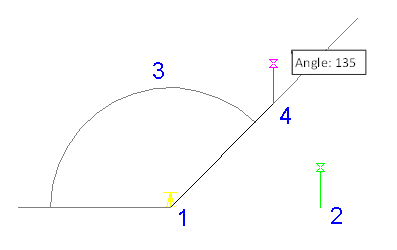When creating an object, such as a line or an arc, you can specify a point by specifying a deflection angle and a distance from another point.

Select the line from which to measure the deflection angle by either selecting an existing line in your drawing, or by specifying a starting and ending point (1 and 2) for the line. Then specify the deflection angle (3) and the distance from the starting point (4).
To specify a point using a deflection angle and a distance
-
Click


 .
.
- To use the Deflection/Distance routine transparently, start a command, such as PLINE or ARC, then enter ‘mapcogo.
- In the COGO Input dialog box, select the Deflection/Distance routine.
- Specify the line to use to measure the angle. Click
 to select the line on the map.
to select the line on the map. - For the first point of an object, specify a starting point and ending point for the line, or select an existing line in the drawing.
- For a later point in the object, specify just the ending point for the line. The previous point of the object is the starting point of the line.
- Enter the deflection angle from the line you just specified to the line of the new direction. Click
 to specify the angle on the map.
to specify the angle on the map. Use the current angular units setting, decimal values, such as 45.1111, or surveyor’s units, such as N 45d3'55" E.
- Enter the distance from the starting point. Click
 to select the distance on the map.
to select the distance on the map. - Click Calculate. AutoCAD Map 3D toolset calculates the new point, and previews it on your map. Click the Pan button to pan to the new point. Note:
If you turn on the Prompt For 3D Data Input option in the Coordinate Geometry Setup dialog box, you can enter an elevation value in the Result section of the COGO Input dialog box.
- Click Create Point.